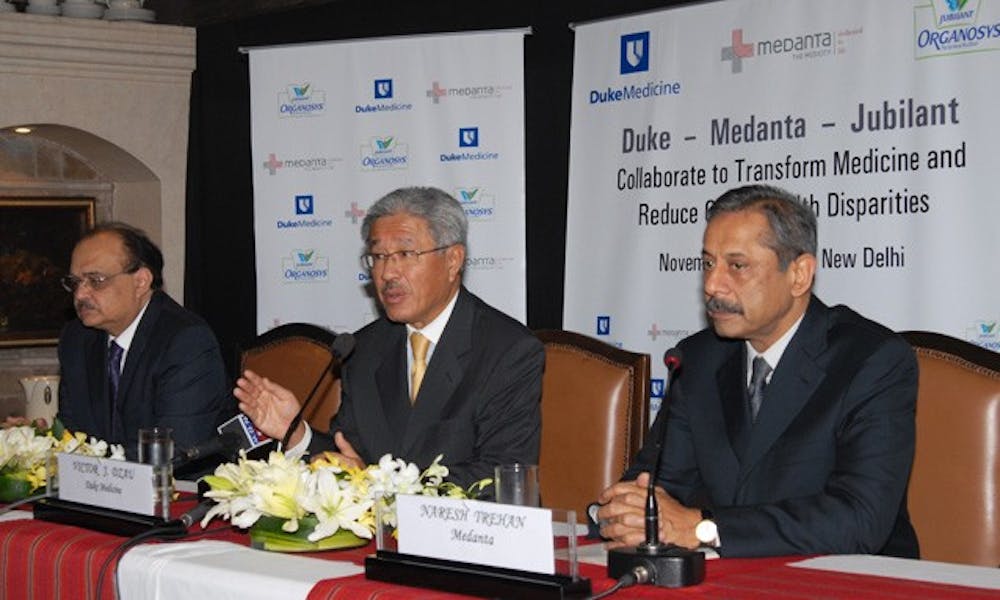Duke is making another move to strengthen global relations—this time, with the prospect of medical advancement in mind.
The University will collaborate on two initiatives with an India-based drug company to develop new drugs and to fund Duke research of disease in the Indian population. The company will provide the necessary funding for these projects that has become more difficult to attain in the United States.
Duke will be working with Jubilant Biosys Limited and Jubilant First Trust Healthcare Limited, a subsidiary of the Indian company Jubilant Organosys Limited, which is the largest integrated custom research and manufacturing services and leading drug discovery and development services company in India. Jubilant Biosys Limited, specifically, is a drug development company that provides solutions to the global pharmaceutical industry.
Last November, Duke signed two letters of intent with the Indian company in New Delhi. The collaborators have been in discussion for more than a year as to how they could work together best.
Dr. Krishna Udayakumar, assistant professor of medicine at the Duke Translational Medicine Institute, was an active player in developing business relations with Jubilant.
“Now that the letters of intent have been signed, we can finalize the agreements in the next several months and kick-start relations in the near future,” Udayakumar said.
Robert Taber, vice chancellor for corporate and venture development at Duke University Medical Center, noted that Jubilant possesses certain assets including funding, resources and expertise that Duke needs to further its drug development projects.
“It’s a natural partnership,” Taber said. “Jubliant is willing to invest in an earlier stage.... They have the resources of preclinical development that we could never develop ourselves.”
The first step of the partnership will focus on four to five research projects each year, applying funding from Jubilant, and co-developing these research projects with some of the work being done at Duke and some being done at Jubilant.
For the last few years, it has become more difficult to attain venture capital to invest in early stage development of drugs and research because investors have become more conservative, Taber noted. Because of these setbacks, Duke has been trying to develop partnerships outside the United States, like its collaboration with Jubilant.
The other aspect of the partnership will be run through the Duke Global Health Institute, which will develop a population-based cohort study. A group of Indian patients will be studied through a Jubilant-owned hospital chain in Kolkata. Blood and urine samples will be collected in order to better understand the history of both infectious and chronic diseases in the Indian population.
“The interesting twist to this is that we’re not just interested in the clinical aspects of the study, but understanding the biology that underlies the development of these diseases particularly in populations as they transition from rural to urban geographies,” said Dr. Svati Shah, assistant professor of medicine in the Division of Cardiology and principle investigator of the study.
Shah added that Kolkata was chosen as the primary location for this study because it represents a wide variety of Indian populations and is the third largest city in India for transitional populations moving from rural to urban settings.
As in its other collaboration with Duke, Jubilant will also fund the study and increase its role in the project by developing biobanking facilities to store the collected blood samples. Because Jubilant is funding the study, the majority of the process will take place in Kolkata.
“In the kind of work that we’re trying to do, there is no single entity that can do this. It has to be collaborative and multidisciplinary as well,” Shah said. “There is something to be said in understanding the epidemiology of disease, but by understanding the biology of disease there can be so much that can be done to prevent disease development in populations outside of the United States.”
As Duke expands its involvement across the globe, the collaborators hope the partnership with Jubilant will improve health relations between the United States and India.
“I think this [collaboration] fits very nicely in Duke’s new global perspective,” Taber said.
Get The Chronicle straight to your inbox
Signup for our weekly newsletter. Cancel at any time.

